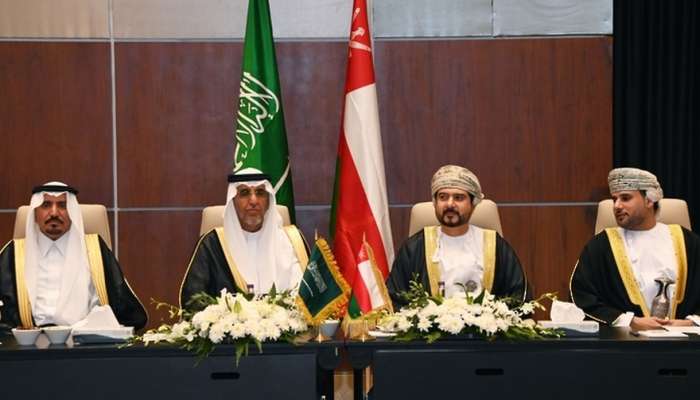
Muscat: The Joint Omani-Saudi Business Council held a meeting on the sidelines of the Omani-Saudi Franchise Exhibition to discuss aspects of economic cooperation opportunities between the two countries.
The meeting was co-chaired by Qais Mohammed Al Yousef, Minister of Commerce, Industry, and Investment Promotion, and Dr. Saad Othman Al Qasabi, Governor of the Saudi Standards, Metrology and Quality Organization (SASO). It was attended by Faisal bin Abdullah Al Rowas, Chairman of the Oman Chamber of Commerce and Industry (OCCI), Sheikh Ali Hamad Al Kalbani, Head of the Omani Side of the Council, Abdulaziz Sami Al Ali, Head of the Saudi Side of the Council, and several Council members.
During the meeting, opportunities for cooperation between the two countries were reviewed, along with a proposal to establish Omani-Saudi strategic partnerships in several promising economic sectors. This collaboration aims to develop joint investments, enhance integration in supply chains, and support the private sector's efforts to achieve the targets of Oman Vision 2040 and Saudi Vision 2030.
Qais Mohammed Al Yousef, Minister of Commerce, Industry, and Investment Promotion affirmed that the Council represents a crucial bridge for enhancing economic and investment cooperation between Oman and Saudi Arabia. He noted that the volume of trade exchange between the two countries reached OMR1.212 billion (equivalent to $3.152 billion) by the end of June 2025, recording a 20.3 percent increase compared to the same period last year.
He explained that the Omani-Saudi partnership, built on strategic economic integration, allows for increased investment in vital sectors and facilitates the entry of Omani products into the Saudi market and vice-versa. He affirmed the government's support for all enablers and facilities that empower the private sector to contribute to sustainable growth.
He mentioned the adoption of mutual recognition of the certificate of origin between the two countries, which helps streamline the flow of goods, unify quality and conformity standards, and enhance industrial integration. He stressed the importance of establishing the Omani-Saudi Joint Company and encouraging joint exhibitions in the fields of franchising, real estate development, and information technology, with a focus on investment in banking, insurance, real estate, industrial, tourism, logistics, and mining sectors.
Al Yousef emphasised that these joint initiatives and projects reflect the commitment of both countries to achieving the goals of Oman Vision 2040 and Saudi 2030, and enhance commercial and investment cooperation, contributing to the prosperity of both peoples.
For his part, Dr. Saad bin Othman Al Qasabi stated that the Omani-Saudi Business Council is an important station in the journey of growing partnership between the two countries. He noted that both countries have made significant strides in economic integration to achieve their respective visions, which focus on economic diversification.
He mentioned that the trade exchange between the two countries is constantly growing, reaching $34 billion by the end of 2024, and approximately $4 billion by the end of the second quarter of 2025. He expressed aspirations to double efforts to increase trade and investment exchange, empower the private sector, establish commercial partnerships, and support entrepreneurship.
He explained that there are promising opportunities for investment in the tourism, mining, logistics, and industrial sectors, and work is currently underway to develop supply chains and modern technology as effective channels for developing economic relations, exploiting investment opportunities, and enhancing trade exchange.
Meanwhile, Faisal Abdullah Al Rowas, Chairman of the Oman Chamber of Commerce and Industry (OCCI), said that the Joint Omani-Saudi Business Council meeting is part of continuous efforts to strengthen the economic partnership and translate the excellent relations into investment opportunities and qualitative projects that enhance the empowerment of the private sector in both countries. He added that the meeting comes at an important time, witnessing accelerated growth in Omani-Saudi economic relations, driven by infrastructure development, logistical connectivity via border crossings, and the integration of developmental visions of the two countries.
Al Rowas added that the OCCI constantly works to address challenges facing investors and business owners, both through direct dialogue with competent authorities and by preparing a more flexible and competitive business environment. He stressed that the Chamber pays great attention to implementing strategic directions in line with Oman Vision 2040 targets, focusing on integrating efforts with Saudi Arabia, especially in promising sectors.
Sheikh Ali Hamad Al Kalbani, Head of the Omani Side of the Council, clarified that the Council represents a strategic opportunity to consolidate the bonds of economic and commercial cooperation between the two countries. The Council has taken important steps towards deepening partnerships between the private sectors in Oman and Saudi Arabia, with joint sectoral committees working to enhance available investment opportunities that support mutual interests.
He added that the Council has worked to shape and frame ideas into joint plans and projects, identifying all aspects, including challenges and obstacles facing joint projects. He noted that these challenges are being resolved given the strong desire of both countries to ensure the success and deepening of investment partnerships, leading to economic integration.
Abdulaziz Al Ali, Head of the Saudi Side of the Joint Omani-Saudi Business Council, affirmed that the Council's meeting, coinciding with the Franchise Exhibition in Muscat, represents a significant milestone in embodying the aspirations of the two countries' leaderships to empower the private sector and enhance its role in economic development. He noted the volume of trade exchange between Saudi Arabia and Oman, explaining that the next phase requires enhancing integration through sectoral committees and practical initiatives, particularly in supporting SMEs and investing in youth capabilities.
He indicated that there are ready opportunities for supply chain integration between factories in both countries in the sectors of chemicals, aluminum, copper, iron and steel, textiles, food industries, fertilizers, and machinery and equipment.
He affirmed that the Business Council is committed to converting these opportunities into strategic investment projects that contribute to economic diversification and raise competitiveness.